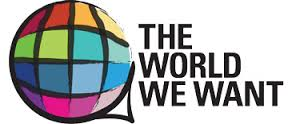UN: “The World We Want” platform
The following piece was published in the January-February 2014 NewsNotes.
The following piece was published in the January-February 2014 NewsNotes.
In 2000, the UN adopted the eight Millennium Development Goals (MDGs), which range from halving extreme poverty to halting the spread of HIV and AIDS and providing universal primary education, all by the target date of 2015. UN member states now are consulting on the shape of the Sustainable Development Goals (SDGs) which will replace the MDGs beyond 2015.
The World We Want is a web platform created by the UN and civil society to hear and amplify the voices of people around the planet, to give them a chance to express their concerns and suggestions in this process of building a global agenda for the SDGs. One of its tools is the Peoples’ Voices series, which brings together panelists and speakers on various issues, both experts and those directly affected by the topic.
On November 19, the fifth session of the Peoples’ Voices series was held at the UN, on the theme of children and the post-2015 development agenda. People around the world were able to participate via livestream on the website.
UNICEF’s Richard Morgan moderated the panel, which included Andrew Johnson, Deputy Secretary-General of ChildFund Alliance; Louise Zimanyi, Director of the Consultative Group on Early Childhood Care and Development; and Ivana Savic, the Organizing Partner for the Major Group on Children and Youth.
Youth participants Erida Bajrami, 16, and Flutura Braka, 17, joined the event via Skype from Albania. According to a press release from the Peoples’ Voices, “They introduced a video documenting child participation in Uruguayan Post-2015 consultations, conducted by SOS Children’s Villages. Bajrami and Braka then presented key messages that emerged from their own national consultation process which included a call for better education and job opportunities, ending discrimination, better child protection, ending violence against children and more equality.
“As Bajrami and Braka noted, the children from the Uruguay consultation were able to ‘open up and feel comfortable with their peers’ in a way that they could not with adults. UNICEF’s Morgan pointed out the uniqueness of the Albanian youth presentation, where ‘children from one continent were introducing and summarizing the voices of another.’”
Maryknoll Sister Elizabeth Roach, a retired missioner who has spent her life working with children, was able to participate in the November 19 livestream from her home in Ossining, NY; Sr. Roach said, “I was able to view the webcast from right here at Maryknoll without making the trip into New York City. The reception was excellent. … Some specific goals [the] teenagers mentioned were education, safety from violence, and safety from abuse, such as sexual and physical violence, as well as corporal punishment in schools. The panelists emphasized the importance of early childhood education and psychological needs of little children. They spoke, too, of the present incarceration of children in many countries. Perhaps the most touching comment of all was the report of a five year-old girl. When asked what she wanted, she said, ‘I would like a long table where everybody can sit and eat.’”
This is a living example of an agenda that leaves no one behind. Through technology, elder adults are able to contribute to the dialogue. As the UN defines new development goals for the 2015 agenda, it is imperative that women, children, people with disabilities, as well as many others including the elderly, be part of the discussion. The table needs to expand so that “everybody can sit and eat.”
Connect with the World We Want platform and learn more about the Peoples’ Voices series here.

